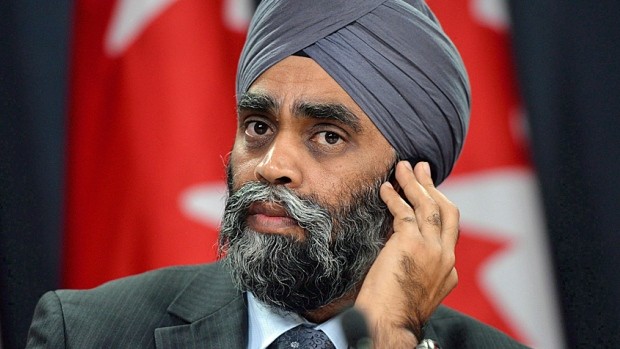Canadian Defense Minister drops hints about military mission in Libya

Defence Minister Harjit Sajjan says Canada could soon join a military coalition to take on ISIS in Libya, a country beset by a civil war and mounting Islamic terrorism.
“I had a good meeting with my counterpart, the minister of defence from Italy, [on military intervention in Libya],” Sajjan said following a NATO defence ministers’ meeting in Brussels..
“Italy is willing to take the lead on this; once we have a good understanding of the political situation, that will allow us to figure out what we need to do,” said in an interview with Chris Hall on CBC Radio’s The House.
More than four years after Moammar Gadhafi was deposed — in large part due to Western military intervention — Islamic State militants have taken advantage of the resulting political vacuum to establish themselves in Libya’s coastal cities.
An estimated 3,000 ISIS fighters are in the country, which has been attracting more foreign recruits in recent months as the journey to Iraq and Syria has become more difficult with Turkey tightening its border with Syria.
Italy has said it wants a leadership role in stabilizing Libya — one of its former colonial possessions — because it is located less than 300 km from the Italian island of Lampedusa.
ISIS-backed elements have carried out several attacks on oil installations, and at least 60 were killed by an suicide bombing against a Libyan police training center earlier this month.
“Before we can actually say ‘Yes we’re interested,’ ‘Yes we can do this,’ we’re doing what all responsible coalition partners should do [asses the political and security situation] and then decide if we have the right capabilities to assist in this mission.
“We will be part of that conversation,” Sajjan said.
The defence minister said that any military action in Libya would be based on lessons learned from Canada’s experience in Afghanistan.
“It’s all about fighting smarter … there needs to be a political structure in place that you can reinforce so that when you have the military gains you then have a political structure,” to safeguard peace and quell ethnic tensions, he said.
‘State of emergency’ in Libya
At the recent anti-ISIS meeting in Paris — Canada was not invited — Roberta Pinotti, Italy’s defence minister, said action must be taken to beat back advances made by the Islamic State.
“We cannot imagine waiting until spring while the situation in Libya is still frozen,” she said. “Efforts to resolve the Libyan crisis must be coordinated internationally,” Pinotti added, warning that “it is impossible for the international intervention to wait until the upcoming spring.”
Pinotti said that there was “total agreement” among the coalition partners at the Paris meeting that Libya’s government should ask the West for help to fight ISIS, to avoid fuelling “jihadist propaganda” of yet another “Western invasion.”
She went on to say that the so-called Islamic State was strengthening in the current political vacuum, prompting Italy and its allies to prepare for an “emergency,” adding that the United States recently has expressed “a greater concern” over ISIS militants in Libya.
How to submit an Op-Ed: Libyan Express accepts opinion articles on a wide range of topics. Submissions may be sent to oped@libyanexpress.com. Please include ‘Op-Ed’ in the subject line.
- Libya’s HCS invites applicants for key state roles - December 31, 2023
- UK calls on Iran to prevent escalation in Israel-Hamas conflict - November 05, 2023
- Libyan Interior Minister: Immigrant shelter costs a fortune - November 05, 2023


